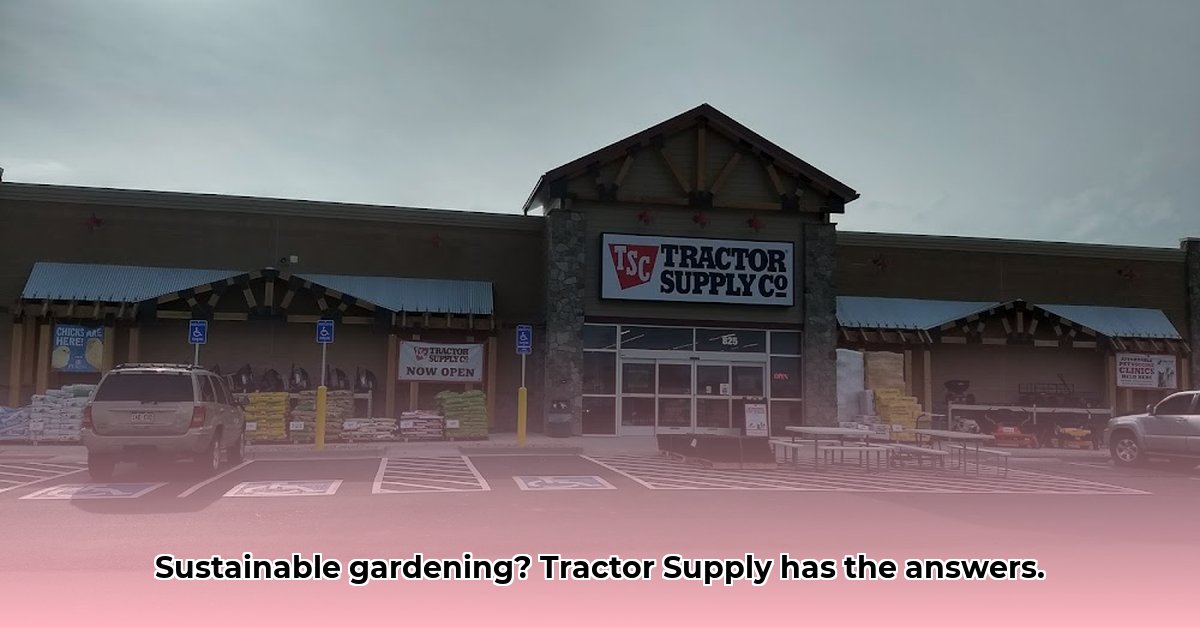
Navigating Sustainable Choices at Tractor Supply
Starting a sustainable garden or farm can feel daunting. Finding the right supplies and making environmentally responsible choices requires careful consideration. Tractor Supply Company (TSC) in Longmont, Colorado, offers a wide range of products that can support sustainable practices, but its role in promoting sustainability requires closer examination. This article analyzes TSC's contribution to sustainable agriculture in Longmont, highlighting both its potential benefits and limitations. We'll also provide actionable steps for consumers and the company itself to further sustainability efforts. For more on small-scale farming equipment, check out this helpful resource: small tractor options.
Accessibility of Sustainable Resources at TSC Longmont
TSC Longmont offers a broad selection of products relevant to sustainable gardening and small-scale farming. These include seeds and seedlings, various types of soil and compost (including options made with recycled materials), tools for planting and harvesting, raised garden beds, and even chicken coops. The store provides resources for water conservation, such as drip irrigation systems and water-saving tools. While this variety is beneficial, the abundance of choices requires careful consideration to select products aligning with sustainable goals. Many gardeners can find everything they need in one convenient location.
Isn't it remarkable how a single store can offer such diverse tools and resources? But how effective are they truly in supporting sustainable practices?
The Absence of a Clear Sustainability Message
Despite offering products that can support sustainable agriculture, TSC's marketing and online presence lack a clear and consistent emphasis on sustainability. The company doesn't prominently showcase organic products or highlight its commitment to environmentally-friendly practices. This lack of transparency makes it difficult for consumers to identify sustainable options readily and may deter those actively seeking eco-friendly choices. This arguably hinders their ability to fully engage environmentally conscious consumers.
How can consumers confidently choose sustainable options when the store doesn't explicitly label them as such?
The Dual Nature of TSC's Impact: Positive and Negative Aspects
TSC's impact on sustainable agriculture presents a complex picture. On one hand, its range of supplies enables sustainable practices such as homegrown food production, reducing food miles, and potentially lowering carbon footprints. The accessibility of resources undoubtedly contributes positively. However, the store also sells products that can undermine sustainable efforts. For example, the availability of chemical fertilizers and pesticides could lead to unsustainable practices if used improperly. The ultimate impact hinges on consumer choices and their understanding of sustainable agricultural practices.
What is the real balance of TSC's impact: environmentally positive or negative?
Actionable Steps for a Greener Longmont
Several stakeholders can take concrete steps to enhance the sustainability of local agriculture using TSC Longmont as a resource:
1. For Small-Scale Farmers: * Strategic Product Selection: Prioritize organic and sustainably sourced products. * Advocate for Change: Communicate your needs and preferences to TSC management. * Support Local: Complement TSC purchases by sourcing materials from local suppliers.
2. For Backyard Gardeners: * Prioritize Soil Health: Utilize compost and organic fertilizers. * Reduce Chemical Use: Minimize or eliminate chemical pesticides and fertilizers. * Community Engagement: Join local gardening groups to share knowledge and resources.
3. For Tractor Supply Co.: * Transparency: Conduct a sustainability audit of supply chains and product sourcing, publicly sharing findings. * Promote Sustainable Options: Clearly label and actively promote products supporting sustainable agriculture. * Partner with Local Producers: Offer locally sourced, sustainable products.
4. For the Longmont Community: * Support Local Food Systems: Patronize local farmers' markets and community gardens. * Advocate for Sustainable Practices: Support local policies promoting sustainable agriculture and environmental protection.
Conclusion: A Shared Responsibility for Sustainability
Tractor Supply Longmont plays a significant, though indirect, role in the local sustainable agriculture landscape. While the store provides valuable resources, increased transparency and a more pronounced commitment to sustainable practices would strengthen its positive impact. This requires a collaborative effort, involving TSC, consumers, and the Longmont community. Further research on consumer purchasing patterns within the store would offer clearer insights into its overall environmental impact. The future of sustainable agriculture in Longmont depends on informed consumer choices and a greater commitment from businesses like TSC to actively support environmentally responsible practices.